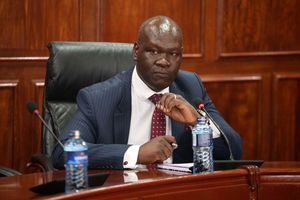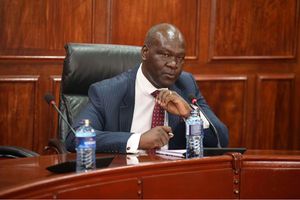
The National Assembly during a past session.
The Parliamentary Service Commission has failed in it's bid in court to overturn a decision of the salaries agency to cap allowances paid to Members of Parliament for attending House committees.
PSC had protested the capping of the lawmakers' income from sittings of House Committees by the Salaries and Remuneration Commission (SRC) was illegal. The capping of the allowances affected their monthly pay as it came following abolishment of the Sh250,000 monthly accommodation allowance.
Stating that SRC acted beyond it's legal powers, the PSC said the salaries agency can only prescribe the allowance payable to MPs on each sitting but not the number of monthly sittings the MPs should undertake.
Court papers indicate that SRC capped the maximum allowances MPs and Senators can earn monthly in form of House Committee sitting allowance to Sh240,000 for the chairperson and Sh192,000 for the vice-chair person.
Each committee member earns a maximum of Sh120,000 after getting Sh7,500 per sitting. The chairperson and vice-chairperson earn Sh15,000 and Sh12,000 per sitting, respectively.
PSC, through lawyer Prof Tom Ojienda, Senior Counsel, argued in court that SRC cannot prescribe how many times each MP or senator sits in House Committees and that doing so is to undermine the independence of Parliament as an institution.
But justices Gatembu Kairu, Francis Tuiyott and Jessie Lesiit ruled that the issue had been resolved by the two State bodies pending determination of the appeal and that there was no more controversy.
Genesis
The legal dispute originated from decision of the SRC to abolish House allowances for MPs. The dispute escalated to the Court of Appeal in December 2020 after the High Court ruled that the 416 Mps and Senators illegally allocated themselves a Sh250,000 monthly accommodation allowance and ordered the PSC to recover the money in one year.
"We are of the view that the PSC's fate was sealed when it engaged the SRC and compromised remuneration and salaries. The appellants submitted to the mandate of the SRC and has abided its directions and supervisory role over it. It cannot re-open the issues of the number of sitting allowances remunerable before us in this appeal," said the judges while dismissing the appeal lodged by PSC jointly with the lawmakers.
They noted that the gazette notice that resulted from the compromise is itself clear that the SRC had not capped the number of times committees can sit.
It capped the maximum allowances members can earn each month as House Committee sitting allowance.
This means while the number of committee meetings the lawmakers can attend are not capped, they cannot earn more in sitting allowances than prescribed by the SRC.
The judges further noted that pending determination of the appeal, SRC and PSC struck a deal on salary review culminating with Gazette Notice dated August 9, 2023 titled "Remuneration and benefits for State officers in the Senate and National Assembly".
Secondly, there was compliance with the High Court order directing that all sums paid to the MPs as house allowances be recovered from them within the timeline set by the High Court.
SRC petition
SRC and rights advocacy groups led by Katiba Institute argued that when Salaries agency sets the payable allowances and the number of sittings for which allowances are payable, it is acting consistently with its constitutional mandate under Article 234 and 235 of the Constitution.
Lawyer Peter Wanyama for SRC stated that as a policy there was need to ensure that the salaries and benefits payable to State officers were fiscally sustainable to the public offices.
"Kenya does not have public coffers that are bottomless and therefore, because of that, the SRC has been set by the people of Kenya. SRC's powers is to set and review the remuneration and benefits of all State officers, who include MPs, and that it acted within its constitutional and statutory mandate when it set the salaries and allowances payable to MPs," said Mr Wanyama.
He stated, "The appellants seem to base their argument on the doctrine of parliamentary sovereignty where Parliament can sit and decide on issues willy nilly without regard to the Constitution and the applicable laws".
He was backed by lawyer Dudley Ochiel of Katiba Institute, who urged that MPs are well paid and when SRC allows additional allowances then the allowances should not exceed the basic pay.
"Kenyans specifically called for a Salaries and Remuneration Commission that would set working conditions- the salaries, benefits and working conditions of members of parliament. What SRC caps is not the number of sittings but the number of payable sittings, and that there is a constitutional rationale to that," said Mr Ochiel.










